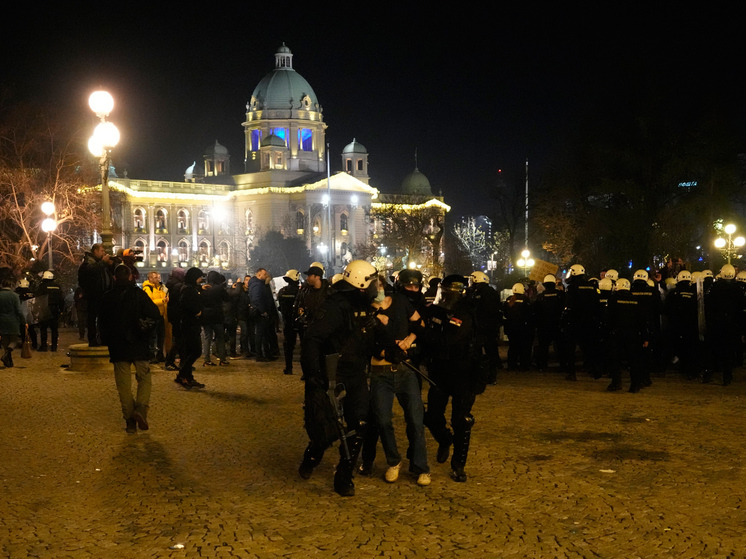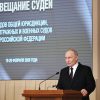The pro-Western movement “Serbia against violence” in practice turned out to be not at all against violence
New in the “obvious-incredible” category: activists of the movement “Serbia against violence” storm the Belgrade city hall and use at the same time, not the methods of passive resistance of Mahatma Gandhi, but violence itself. Welcome to the strange and not too familiar world of Serbian domestic politics. However, I immediately make an amendment: fortunately for Serbia, this world is not unfamiliar to all citizens of the Russian Federation. As follows from the statements of the country's leadership in Belgrade, it was thanks to the Russian special services that the putsch of the “Serbs against violence” was thwarted.

Serbian Prime Minister Ana Brnabic: “This probably won’t be popular in the West, but I really, especially tonight, feel that it is important to stand up for Serbia and thank the people from the Russian intelligence services who had all this information and shared it with us, and we are with everyone else. And everyone else said, okay, no, this is Russian disinformation.” So, Moscow saved Serbia from a coup d'etat — and at the same time its own interests in this country.
Serbia Against Violence is a loose coalition of different groups that emerged in the wake of two high-profile crimes in May this year — a shooting at a Belgrade high school (attacker: seventh grade student, ten dead, six wounded) and a shooting in a rural area near the capital (attacker: : 20-year-old young man who quarreled with his friends at a football stadium, nine killed, twelve wounded). Like all political organizations that stand “for all that is good and against all that is bad,” “Serbia Against Violence” united people of very different views. But among its leaders there were also figures with pronounced pro-Western and anti-Russian sentiments.
Former Minister of Education of the Serbian Autonomous Region of Vojvodina Marinika Tepic, summer 2022: Russia’s actions in Ukraine are “not a violation of traffic rules”, support for sanctions against Russia is “not only a matter of compliance with the norms of the European Union, but also a civilizational position.” Approximately the same thoughts were expressed by another big man in “Serbia Against Violence” — designer and politician Radomir Lazović, making, however, a strange caveat that support for sanctions will not necessarily mean that “Serbia is moving to the West.”
Of course, the rise of such people to power in Belgrade—or even simply the increase in their political influence—is in no way consistent with Moscow’s interests. Therefore, we can state: at the end of 2023, they were protected in the most effective and efficient way. But the new year 2024 will certainly bring with it new challenges. Why new ones though? These will be the same calls in a new shell. Serbia has long been hopelessly divided. To put it roughly, she wants to “maintain both innocence and acquire capital.” “Acquiring capital” means joining the European Union. But this requires officially recognizing the independence of Kosovo — a region that every self-respecting Serb considers an integral part of their country — and introducing sanctions against Russia. Meanwhile, Russia, as a permanent member of the UN Security Council, is the very state that is blocking the full recognition of Kosovo as an independent state at the international level.
Add to this Serbia’s dependence on Russian gas supplies. According to the “old friendship”, Moscow supplies Belgrade with blue fuel at a very discounted price. As Serbian President Aleksandar Vučić openly admitted, if these benefits did not exist, his country would simply go bankrupt. But at the same time, the European Union in particular and the collective West as a whole do not even think about reducing the amount of their pressure on Belgrade. The Serbs are constantly being told on their brains: finally introduce sanctions against Russia — otherwise it will be bad for you!
It turns out that Serbia is in a dead end from which there is no comfortable and painless way out. The comical fiasco of the Serbs Against Violence’s attempts to seize the capital’s mayor’s office is clearly not the final point of this search. While understanding the views of Serbian politicians on the “Russian question,” I came across the following interesting statement by a professional psychiatrist, member of parliament Sanda Raskovic-Ivic from the People’s Party: “If they are really our friends, then Russia should forgive us for introducing a soft package of sanctions against it.” In the original Serbian version, this statement sounds even more extravagant than in the Russian translation: Russia is promised “gentle” sanctions. No, you definitely won’t get bored with our Serbian friends. It’s even interesting: what exactly will they learn next year?
























































Свежие комментарии